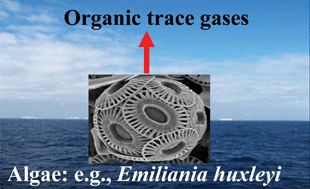Five marine cosmopolitan phytoplankton species namely; Calcidiscus leptoporus, Emiliania huxleyi, Phaeodactylum tricornutum, Chaetoceros neogracilis and Dunaliella tertiolecta were screened for emissions of selected VOCs using head space gas chromatography/mass spectrometry (HS-GC/MS) in single ion mode. The VOCs investigated included isoprene and various halogenated compounds. Among the different algae groups, the two diatoms Ch. neogracilis and P. tricornutum were the strongest emitters of methyl bromide (CH3Br), and Ch. neogracilis was the strongest emitter of isoprene. Furthermore, we present evidence that several chlorinated organic compounds, normally considered as anthropogenic, can be produced from marine phytoplankton (namely chloroform, dichloromethane, trichloroethylene, tetrachloroethylene, chlorobenzene and dichlorobenzene).
You have access to this article
 Please wait while we load your content...
Something went wrong. Try again?
Please wait while we load your content...
Something went wrong. Try again?


 Please wait while we load your content...
Please wait while we load your content...